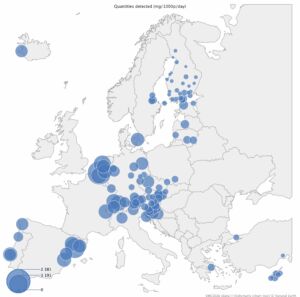News
High level of cocaine found in Copenhagen’s wastewater – study
This article is more than 2 years old.
Belgian and Dutch cities generally lead the way for most drugs

Cocaine use in various European cities: in Holland and Belgium the circles are almost as big as their pupils (graph: EMCDDA)
A new study analysing drug residue in wastewater in European cities has found that Copenhagen has one of the highest concentrations of cocaine in Europe.
Its levels, however, pale in comparison to Antwerp’s and some cities in the Netherlands.
Among other findings, it emerged that Copenhagen’s wastewater has far higher levels of cocaine on weekends – almost double, in fact.
Other cities have more of a consistent concentration throughout the week, and Prague even has more cocaine residue on weekdays.
Other drugs
The study analysed wastewater levels of various drugs.
Copenhagen’s levels were comparable to many other western European cities for amphetamines, methamphetamine and MDMA, although has a significantly higher concentration of ketamine.
Consistently high scorers were Belgian and Dutch cities, which topped the charts for most of the drugs analysed, but not ketamine and methamphetamine.
Methamphetamine, as the study explains, is generally much more common in eastern Europe.
This is particularly true in the Czech Republic where, again, its use is more common during the week than on the weekend, when they are presumably recovering for next week.










































